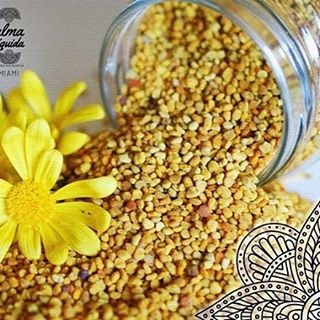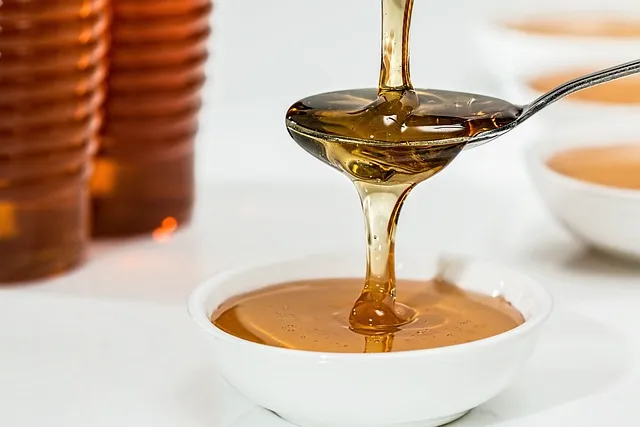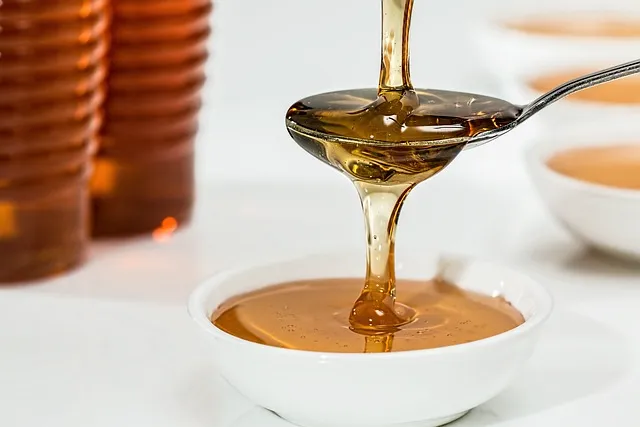Health benefits of eating bee pollen? Is bee pollen good for allergies?
Bee pollen has earned its name as a superfood thanks to its outstanding role in our overall health and wellbeing. It is loaded with so many health benefits to the extent that the German Federal Board of Health refers to it as medicine. Its nutritional composition outshines practically any other food consumed by man and is promoted as an effective dietary supplement.
Bee pollen boosts an array of minerals, antioxidants, and vitamins, making it exceptionally healthy.
Similar Articles you may like to read –
How much raw honey per day I can eat? How much Honey is safe to eat?
How much honey to put in a tea?
Why do vegans not eat honey?
How to Determine honey? How To check the purity of honey?
Bee Pollen Nutrition Facts
What is Bee Pollen?
Bee pollen refers to the natural blend of small crunchy pellets made by worker bees when they mix flower pollen, nectar, and saliva. This happens in the field.
As they forage from flower to flower, pollen sticks to their statically charged hairy bodies. When they are fully covered with pollen, they comb it out with specialized structures on their front legs, mix it with regurgitated nectar and saliva, and store it on pollen baskets on their hind legs. When the sacs are full, they ferry them back to the nest.
It is collected with pollen traps positioned at the entrance of the hives. When bees pass through the minimized openings, pollen falls into a collection bin. The product is then dried and packaged as granules, ground into powder, or even transformed into pills.
Bee pollen appears as tiny dark brown, yellowish-orange, or black granules. It has a sweet floral taste that depends on the plant of origin.
How Bee Pollen is Harvested
Beekeepers harvest pollen using pollen traps. These are devices made of plastic or wire mesh placed in front of the hive entrance. Worker bees from foraging pass through the traps, and as they get into the nest, the mesh scraps the pollen loads off their legs into a gathering tray.
Nutritional Contents of Bee Pollen
Bee pollen consists of proteins, calories, fat, carbohydrates, and about 250 nutrients, including flavonoids, vitamins, macro, and micronutrients, phenolic substances, enzymes, and coenzymes.
The percentages of the various nutritional components depend on the plant or floral source and the season it is collected. For instance, protein from some pollen sources can be as low as 7 percent, while in others, it can be as high as 35 percent.
Pollen collected in spring may have a different composition from that collected in summer.
This fantastic product also demonstrates various actions such as antiviral, anti-fungal, anti-inflammatory, anti-microbial, immunostimulating, and analgesic. These properties enhance its apitherapeutic treatment.
How to Consume Bee Pollen
Bee pollen is sold as natural granules, which you can take with a spoon. You can add it to smoothies, salads, oatmeal, yogurts, or topping in cereals. You can also smash it into powder. If you are new to taking bee pollen, it is advisable to take a small amount first.
You may also soak the granules in water for a few hours before taking them. This makes it more digestible.
Alternative health promoters propose starting with a quarter spoon and increasing gradually to 2 teaspoons.
If you develop allergic reactions, stop immediately. You should store this product in a cool, dry place and away from sunlight.
Health Benefits of Bee Pollen
An Outstanding Source of Countless Nutrients
Bee pollen boasts a rich source of minerals, vitamins, proteins, phenolic substances, and enzymes. The nutritional makeup depends on the floral basis it was harvested from.
Although not a complete food, bee pollen boasts most of the best aspects of food that are incredible for humans.
It may work well as a dietary supplement that benefits your diet and health and can promote your lifespan and reproductive life. Bee pollen also earns its name as a natural multivitamin since it is a complete protein. The high concentration of amino acids anchors crucial processes of operations such as hormone and neurotransmitter synthesis.
It is also safe for most people and is easy to incorporate into your diet.
Ease Inflammation
Bee pollen has been used conventionally to reduce swelling and inflammation. It possesses inflammatory properties that help to relieve inflammation.
Offers Protection against Free Radicals and Chronic Diseases
The high antioxidant levels in bee pollen help shield the body from potentially harmful molecules( free radicals). Damage to body cells by free radicals can lead to cancer, type 2 diabetes, and other chronic diseases.
Some of the antioxidants present in bee pollen include glutathione, flavonoids, quercetin, kaempferol, and carotenoids. Research shows that these antioxidants destroy harmful bacteria, inhibit the growth of tumors, and help fight infection.
Helps to Reduce the Risk of Heart Diseases
One of the risks of heart disease is high cholesterol. Bee pollen helps cut this threat by lowering cholesterol and high blood lipids.
Pollen may also shield the lipids from oxidizing. When lipids oxidize, they tangle together, clogging blood vessels and raising the risk of heart diseases. Heart disease is a leading cause of death worldwide.
Another crucial benefit of bee pollen is that it strengthens the walls of blood vessels improving circulation and heart health.
Research also revealed that people with shortsightedness due to clogged arteries (cholesterol) increased their field of vision after taking bee supplements.
Boost Liver Health
Bee pollen promotes the liver’s health, its detoxifying abilities and enhances the healing process in case of liver damage. It also safeguards the liver against damage by toxic substances. The liver plays a critical role in breaking down and eliminating toxins in your body.
Boosts the Immune System
A healthy immune system greatly supports your well-being. Bee pollen contains antiviral, antifungal, and antimicrobial properties that help fight off bacterial and viral infections. It may also mitigate the effect and onset of allergies.
Works as a Dietary Supplement
Bee pollen can work as a supplement that boosts your health and diet.
Ease the Symptoms of Menopause
Menopause is usually characterized by unbearable symptoms such as night sweats, sleep disturbances, mood swings, and hot flushes. Research shows that women who take bee pollen supplements have less intense menopause symptoms than those who don’t.
Help to Fight Stress
Bee pollen can boost blood flow to the nervous system, helping ease stress. It also helps you to overcome tiredness.
Speeds Wound Healing Process
Research shows that bee pollen can be used to promote healing on the skin by killing bacteria, increasing blood circulation, and moistening the skin. The healing process is aided by this product’s antioxidant, antimicrobial, and anti-inflammatory properties.
Bee Pollen Boosts Body Nutrient Utilization
This fantastic product may enhance your body’s usage of nutrients such as iron, calcium, and phosphorus. Iron absorption is enhanced by vitamin C and bioflavonoids in bee pollen. The outstanding proteins and amino acids aid the absorption of phosphorus and calcium.
Promotes Skin Health and Fights Premature Aging
The high concentration of antioxidants helps to reduce the signs of aging. A myriad of face creams contains bee pollen to minimize the appearance of aging signs. It is used in skin care products for treating diaper rash, pimples, and eczema.
Helps in Weight Management
Bee pollen boosts calorie burn by enhancing the body’s natural metabolic processes. It also contains a natural appetite suppressant known as phenylalanine, which helps you overcome cravings.
It also helps to increase body weight and muscle mass. Studies carried out on malnourished animals showed increased body weight after consumption of bee pollen.
Bee pollen Possess Anticancer Properties.
Bee pollen may be instrumental in preventing and treating cancer by stimulating the programmed death of cancer cells and inhibiting tumor growth.
Bee pollen from some sources is thought to have estrogen properties that can lower uterine, prostate, and breast cancers. It also works to lessen the aftermath of chemotherapy.
Helps to Fight Osteoporosis
Bee pollen may benefit people with osteoporosis by increasing their calcium and phosphate levels and also protecting against the condition.
Boosts Energy Levels
It is believed that bee pollen boosts red blood cells and stimulates metabolism, which increases energy levels. Athletes have been utilizing this rich product to enhance their performance. The energy provided by bee pollen lasts longer due to its high protein content. With a whopping 22 essential amino acids, it qualifies as a complete protein source.
Allergic Reactions Linked to Bee Pollen
- Itching
- Swelling
- Lightheadedness
- Difficulty breathing
- Running nose
- Coughing
- Nasal congestion
- Sinus pressure
- swollen lips or tongue
What is Apitherapy
Apitherapy utilizes bee products such as bee pollen, venom, royal jelly, honey as a form of medicine. This is practiced by some traditional healers( Medicinal practitioners). It is used to treat diseases such as arthritis, multiple sclerosis, shingles, and various infections. Honey bee products may be taken orally, applied, or injected into the blood. This kind of treatment has been used for thousands of years.
Unadulterated and fresh products give the best results for apitherapy.
Cautions to Observe While on Bee Pollen
- Before taking bee pollen supplements, talk to your doctor. It may interfere with some medications.
- It is advisable to buy bee pollen only from reputable sources. This product can be tainted and possess potentially harmful ingredients that lead to serious side effects. It can be contaminated during storage or collection.
- If you are allergic to bee stings, you should avoid bee pollen. Also, people with asthma or other allergies should avoid using pollen.
- If after taking the supplement, you experience swelling, itching, rashes on the skin, or difficulty in breathing, stop taking it immediately.
- Pregnant women should not take bee pollen because it may tamper with the pregnancy by stimulating the uterus. Breastfeeding women should also avoid.
- For people under blood-thinning medication, it may increase the risk of bleeding.
Is Bee Pollen Good for Allergies
It is believed that ingesting pollen will enhance the body to build resistance to potential allergens which helps to manage seasonal allergies. This resistance helps to reduce allergy symptoms; the same way vaccines prevent diseases.
It also stimulates your immune system to generate antibodies in large numbers to eliminate allergic reactions.
It is advisable to take about 20- 40 grams daily ( 3-5 teaspoons) for better results for around three months. Allergic reactions to bee pollen can be severe and fatal. Research shows that if taken regularly for at least six weeks before the onset of hay fever, it helps minimize the body’s sensitivity to seasonal allergies.
However, if you have bee stings or products, it is good to avoid bee pollen.
Bottom Line
Numerous studies that support bee pollen’s nutritional and health benefits were conducted on rodents. So their response to human beings is still unclear. But this does not signify or cancel the claims. It means that more research is essential.
FAQs
How much pollen should l take?
Bee pollen is not a proven treatment; therefore, it has no standard dose. However, when starting, take a small portion to check whether you are allergic.
Is bee pollen safe for me?
Bee pollen is safe for most people unless you have pollen allergies.
More articles you may like to read –
How much honey should you take for a sore throat? Home Remedy
Is honey bee poop or vomit?
Can honey carry disease? honey and disease
Can you eat honey straight from the hive?
Does honey expire? Can honey be ok after 12 months?
How do l know l have bee pollen allergy?
An allergic reaction may cause swelling, itches, hives, shortness of breath, and redness on your skin.
How is bee pollen used?
Bee pollen is available in dietary supplements. It is also used in skin softening products.
Does trapping pollen affect the bees?
Pollen trapping can only harm the bees if it is done for an extended period of time. Insufficient pollen interferes with brood rearing, colony survival, and even the adult population.
How can you describe the taste of bee pollen?
Bee pollen has a sweet and floral taste with a powdery texture. Individual tastes vary depending on the floral source.
Where can l find bee pollen?
You can buy pollen from reputable retailers, herbal supplement shops, and health food stores.
What is the best time to take bee pollen?
You can take bee pollen at any time of the day or time.
Can bee pollen help me to gain weight?
Bee pollen can help you to increase your body weight and body mass.



